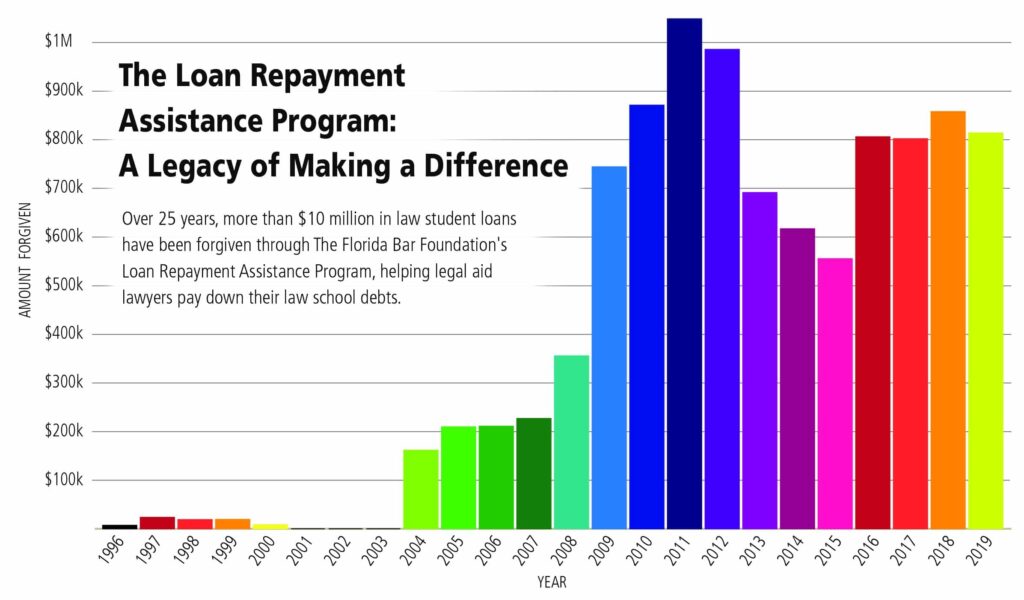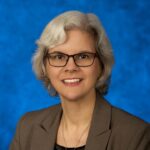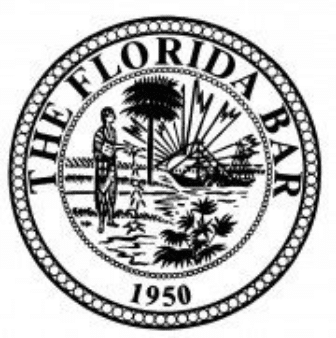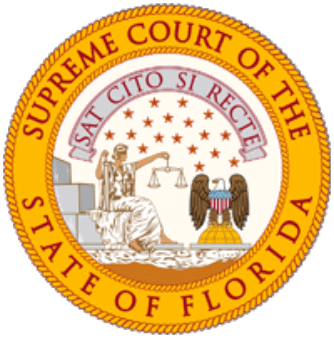 In December 2023, The Florida Bar Foundation changed its name to FFLA. Posts prior to this date contain our former name.
In December 2023, The Florida Bar Foundation changed its name to FFLA. Posts prior to this date contain our former name.
Since 1996, lawyers employed by Florida’s civil legal aid providers have been able to pay down more than $10 million of their law school loans thanks to The Florida Bar Foundation’s Loan Repayment Assistance Program (LRAP).

“But for LRAP, I would not have been able to remain in legal services,” says Jena Hudson, Pro Bono Manager at Bay Area Legal Services. “As a new attorney with over $130,000 of student loan debt, I began applying for jobs elsewhere after one to two years because I just could not afford to pay my living expenses and my student loans.”
“I applied for LRAP as soon as it came into existence,” Hudson says. “I still do love my job after 20 years and have dedicated myself to public service despite the lower salary. I continue to have a significant amount of law school debt and even at my management salary, would still to this day have difficulty continuing to pay my loans and support my son as a single parent if LRAP assistance was no longer available.”
Using funds from Florida’s Interest on Trust Accounts (IOTA) program, the Foundation loans legal aid lawyers up to $5,000 each year to pay their law school debts, then forgives the loans as long as the lawyers continue to work for a legal aid program.
LRAP was created to strengthen and expand legal assistance for the poor by supporting the recruitment and retention of qualified civil legal aid staff attorneys.
In 2020, according to the American Bar Association, more than 75% of lawyers surveyed had at least $100,000 in student loans at graduation. That debt is even more of a burden for legal aid lawyers, who earn considerably less than those in private practice.

“I am a first-generation attorney and Vietnamese-American. Previously, I was a special education teacher and social worker for 20 years,” says Jeff Eckert, a Bay Area Legal Services (BALS) staff attorney. “I entered law school at 43 years old and incurred a tremendous amount of student loan debt to do so, even while still working full- and part-time.”
“However, I became a lawyer because of my strong desire to advocate for others, especially children and adults with disabilities and veterans,” Eckert says. “LRAP enabled me to work at BALS, and serve veterans and clients with urgent legal needs who would otherwise be unable to afford legal services or representation. I would likely not be able to continue working for BALS without LRAP. This program not only directly benefits attorneys such as myself, but eventually the many clients, families, and communities we serve.”
A 2015 National Legal Aid and Defender Association survey showed that “dramatically reducing student loan forgiveness for lawyers working in the public interest would profoundly diminish access to justice for low-income people.”
Another Bay Area Legal Services staff attorney, Jennifer Broomfield, intended to work for a legal aid or legal services non-profit law firm after her law school graduation in 2002.

“I fell in love with public interest work, but unfortunately due to my crippling law school debt, I was not able to pursue a public interest law career,” Broomfield says.
Instead, she became a college administrator, a position with high pay. But in the summer of 2019, her father became ill and Broomfield returned to Florida to care for him.
“I really wanted to return to the reason I went to law school in the first place,” Broomfield says. “That’s when I saw the posting for BALS’ Veterans Legal Helpline. I held my breath, applied, and hoped there was some way that I could afford to take the position should it be offered to me.”
When she received the job offer, it was a 50% cut in pay.
“My heart began to sink, but if I received LRAP, it would cover the bulk of my current student loan debt. I decided doing what I loved was worth the lifestyle changes I would need to make, as long as I knew my student loan was covered. LRAP made it possible for me, 17 years after graduating law school, to take the job I always wanted.”
The Foundation is in the process of reviewing the 2020 loan forgiveness applications and expects to forgive approximately 214 loans.
Lisa Brody, BALS’ assistant deputy director, believes LRAP plays a pivotal role in legal aid lawyers’ lives.

“LRAP has enabled not only myself, but several other attorneys of color that I personally know to continue to pursue our passion of serving our communities as public interest attorneys through our work,” Brody says. “LRAP has played a critical role in the recruitment and retention of attorneys to the important work that is undertaken by legal services attorneys. Not only does it provide financial assistance to already loan-burdened attorneys, but even more importantly, it exemplifies that priority and commitment on behalf of The Florida Bar Foundation to ensuring that we have a pool of qualified attorneys that racially reflect the diverse communities that we serve.”




